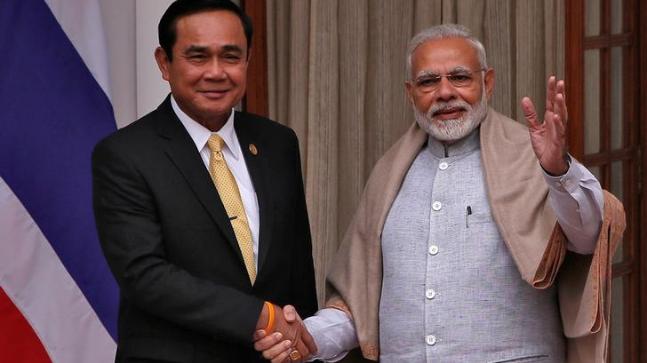


Indian Prime Minister Narendra Modi and his Thai counterpart Paetongtarn Shinawatra met at the East Asia Summit in Vientiane to discuss ways to strengthen their countries' cooperation in various sub-regional and multilateral fora. This marked the first meeting between the two leaders, with Modi congratulating Shinawatra on her assumption of office and discussing India's 'Act East' policy and Indo-Pacific vision. The leaders also exchanged views on regional cooperation through BIMSTEC, highlighting the importance of India's ties with Thailand.
Narendra Modi and Paetongtarn Shinawatra Meet at East Asia Summit
In a meeting on the sidelines of the East Asia Summit in Vientiane, Laos, Indian Prime Minister Narendra Modi and his Thai counterpart, Paetongtarn Shinawatra, discussed ways to strengthen cooperation between their countries. This was the first meeting between the two leaders, with Modi congratulating Shinawatra on her recent appointment as Prime Minister.
Modi also discussed India's "Act East" policy and Indo-Pacific vision, which aims to increase India's engagement with Southeast Asia and the broader Asia-Pacific region. The two leaders also exchanged views on regional cooperation through the Bay of Bengal Initiative for Multi-Sectoral Technical and Economic Cooperation (BIMSTEC), highlighting the importance of India's ties with Thailand.
Background
India and Thailand have a long history of cooperation, dating back to the early days of both countries. In recent years, the two countries have strengthened their partnership in a number of areas, including trade, investment, defense, and security.
India is Thailand's largest trading partner in South Asia, and the two countries have set a target of $15 billion in bilateral trade by 2025. India is also a major investor in Thailand, with investments totaling over $10 billion.
In the defense and security realms, India and Thailand cooperate in a number of areas, including maritime security, counter-terrorism, and capacity building. The two countries also conduct joint military exercises on a regular basis.
Top 5 FAQs
1. What is the significance of the meeting between Modi and Shinawatra?
This was the first meeting between the two leaders, and it provided an opportunity for them to discuss ways to strengthen cooperation between India and Thailand. The meeting also highlighted the importance of India's "Act East" policy and Indo-Pacific vision.
2. What is India's "Act East" policy?
India's "Act East" policy is a strategic initiative that aims to increase India's engagement with Southeast Asia and the broader Asia-Pacific region. The policy was launched in 2014, and it has since become a key pillar of India's foreign policy.
3. What is BIMSTEC?
BIMSTEC is a regional cooperation organization that includes Bangladesh, India, Myanmar, Sri Lanka, Thailand, Nepal, and Bhutan. The organization was established in 1997, and it aims to promote cooperation in a number of areas, including trade, investment, tourism, and technology.
4. What is the current state of India-Thailand relations?
India and Thailand have a strong and growing partnership. The two countries cooperate in a number of areas, including trade, investment, defense, and security. India is Thailand's largest trading partner in South Asia, and the two countries have set a target of $15 billion in bilateral trade by 2025.
5. What are the future prospects for India-Thailand relations?
The future prospects for India-Thailand relations are positive. The two countries have a strong foundation of cooperation, and they are both committed to strengthening their partnership. India's "Act East" policy is expected to provide a further boost to India-Thailand relations.

A lone ISIS gunman ambushed a group of US service members and civilians in Syria, killing two and injuring three. The gunman was eventually killed by partner forces, confirmed by the US Defence Secretary. This is the first attack on US troops in Syria since the fall of President Bashar al-Assad. The casualties were transported to a nearby garrison and their identities will be withheld until their next of kin have been notified.

Pakistan's Prime Minister, Shehbaz Sharif, caused a major stir in Turkmenistan when he decided to gate-crash a meeting between Russian President Vladimir Putin and Turkish President Recep Tayyip Erdogan after waiting for 40 minutes. This impulsive move showcases Pakistan's increasing diplomatic insecurity and diminishing geopolitical clout. As Sharif struggles to secure meaningful engagements with major powers, he also faces domestic crises and is under the control of Army Chief Asim Munir. Meanwhile, the event in Turkmenistan marked a milestone for the country's declaration of neutrality and its efforts to maintain independence from both Western and Russian influence.

During an international forum in Turkmenistan, Pakistan's Prime Minister Shehbaz Sharif faced an embarrassing diplomatic moment as he walked into a private meeting between Russian President Vladimir Putin and Turkish President Recep Tayyip Erdogan. Sharif had been waiting for over 40 minutes for his scheduled meeting with Putin, causing him to enter the ongoing conversation between the two leaders. The incident, captured on video and shared by RT India, has triggered widespread mockery on social media with users making jokes about Sharif's actions. This comes as Pakistan attempts to strengthen its ties with Russia, while Putin maintains a closer relationship with India.

The latest bout of border fighting between Thailand and Cambodia has escalated, with hundreds of thousands of civilians displaced and casualties on both sides. The renewed skirmishes have shattered a ceasefire proposed by U.S. President Donald Trump in July. The leaders of both countries have promised to continue their aggressive stance, causing further tension and concerns for the safety of civilians. This has even resulted in the withdrawal of Cambodia's team from a regional sporting event.

Notorious Naxalite commander Ramdher Majji, along with his group, surrendered to the police in Chhattisgarh. This surrender marks a milestone in the fight against Naxalism, as the state's Deputy Chief Minister states that 80 percent of the menace has been eradicated. With the government's resolved aim to eliminate Naxalism by 2026, the country is heading towards a permanent solution to this long-standing issue. Home Minister Amit Shah also noted the significant progress made in reducing Naxal violence, with only 10 percent of the nation's population currently affected compared to 120 million people in the past.

After the tragic fire at their club in Goa, owners Gaurav and Saurabh Luthra have been detained in Thailand and are expected to be brought back to India soon. The Indian agencies have been in constant communication with Thai authorities and have managed to locate the brothers outside the main city area. With their detention, the process for their deportation has been initiated and Indian agencies are coordinating with Thai authorities for their return. The article also explains the general procedure for deportation of foreigners from Thailand under immigration laws.

Two years after the shocking death of Dawn Sturgess from Novichok poisoning, a public inquiry has released its final report. The report, overseen by retired Supreme Court justice Lord Hughes of Ombersley, examined whether British officials had taken adequate precautions to prevent the attack on ex-spy Sergei Skripal and his daughter Yulia in March 2018. The inquiry also investigated whether Ms. Sturgess's death could have been avoided with timely public warnings about abandoned objects. Good Morning Britain correspondent Richard Gaisford reported live from Salisbury, where the attack first came to light, to reveal the disturbing findings of the inquiry.

The Indian Air Force (IAF) has found a solution to maintain its aging Jaguar fleet by obtaining over 20 retired aircraft from the Oman Air Force. These jets will be dismantled and used as spares, as global production of Jaguar has ceased. With this transfer, India will become one of the few countries to still operate the Anglo-French supersonic attack aircraft. The collaboration between India and Oman in this regard reflects their robust defense partnership.

In a monumental decision, UNESCO has officially named India's beloved festival of lights, Deepavali, to its prestigious Intangible Cultural Heritage List during a committee meeting at the iconic Red Fort in Delhi. The news was met with joyous celebrations and performances, with Prime Minister Modi expressing his pride and noting the global impact of Deepavali's inclusion. This marks the sixteenth element from India to be inscribed on the Representative List, solidifying the country's rich cultural heritage.

India's festival of lights, Deepavali, has been added to Unesco's list of Intangible Cultural Heritage, following in the footsteps of Durga Puja. Prime Minister Narendra Modi expressed his delight at the nomination, stating that the festival is closely tied to India's culture and ethos. The nomination process for Deepavali involved diverse communities and experts, showcasing the festival's reach beyond the country, as it joins India's 15 elements already on Unesco's list.